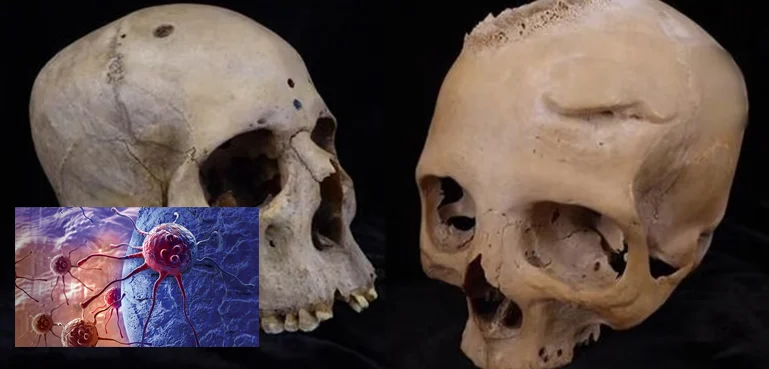Cancer, often perceived as a modern affliction, has deep historical roots, as evidenced by recent research on ancient Egyptian remains. Scientists examining two 4,000-year-old skulls have uncovered evidence of cancer and attempts to treat it, shedding light on the medical practices of ancient civilizations.
Discovery of Ancient Skulls
Researchers unearthed two ancient human skulls, one male and one female, dating back to between 2687 and 2345 BC. The male skull belonged to an individual aged between 30 to 35 years, while the female, who lived between 663 and 343 BC, was over 50 years old. These skulls provided a unique glimpse into the medical conditions and treatments of the time.
Signs of Cancer in Ancient Remains
Detailed examination of the male skull under a microscope revealed a large lesion, identified as a neoplasm, indicative of excessive cell growth. This type of lesion is consistent with cancerous tumors found in modern diagnoses. Additionally, the female skull exhibited about 30 small, round metastasized lesions, suggesting the spread of cancer. These findings were particularly significant as they demonstrated the presence of cancerous growths thousands of years ago.
The analysis also revealed cut marks on both skulls, suggesting surgical attempts to treat the lesions. These marks indicated the use of sharp instruments, likely metal tools, to remove or reduce the tumors. The presence of such marks highlighted the early attempts of ancient Egyptians to manage and treat cancerous conditions.
Insights into Ancient Egyptian Medicine
The study, published in the journal Frontiers in Medicine, emphasized the sophisticated medical knowledge of ancient Egyptians. The cut marks on the skulls indicated that traumatic and oncological treatments were performed, showcasing a rudimentary yet significant understanding of medical procedures.
Edgard Cameros, a pathologist at the University of Santiago de Compostela in Spain, described the discovery as “unique and rare evidence” of ancient medical practices. He noted that this finding provides crucial insights into how ancient civilizations approached cancer treatment.
Tatiana Tondini, a researcher at the University of Tübingen in Germany, expressed astonishment at the discovery. “When we first saw the cut marks under the microscope, we couldn’t believe our eyes,” she said. The marks indicated that ancient Egyptians might have attempted surgical interventions to manage cancerous growths.
Implications for Modern Understanding of Cancer
This research challenges the notion that cancer is predominantly a modern disease caused by contemporary lifestyle and environmental factors. While these factors do contribute to cancer risk today, the presence of cancer in ancient remains suggests that it was also a common affliction in the past. The study underscores that cancer has been a part of human history for millennia.
Legacy of Ancient Egyptian Medicine
The ancient Egyptian civilization, known for its advanced knowledge in various fields, also made significant contributions to medical science. Egyptians were adept at diagnosing diseases, treating traumatic injuries, and even performing complex medical procedures such as artificial limb creation and dental fillings. The discovery of cancer treatment attempts adds another layer to their medical legacy.
These findings illustrate the early efforts to understand and treat serious health conditions, demonstrating that ancient civilizations had a profound impact on the development of medical practices. The research on these ancient skulls not only enriches our understanding of history but also provides valuable context for the evolution of medical science.
The discovery of cancer in 4,000-year-old Egyptian skulls and the evidence of surgical treatment attempts highlight the remarkable medical knowledge of ancient civilizations. This research bridges the gap between ancient and modern medicine, revealing that cancer has been a persistent challenge throughout human history. The advanced medical practices of the ancient Egyptians continue to inspire and inform contemporary medical science, emphasizing the timeless nature of the quest for healing and understanding of the human body.



